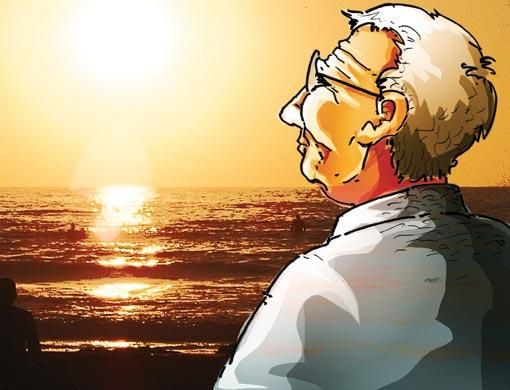The first impulse the news triggers in you is shock, followed by grief, followed by a long stretch of reflection on the meaning of it all. The death of my friend Adnan Ammouri last week would not, under normal circumstances, have elicited those sentiments on my part. We all must go one day, for death, in the end, is the ultimate democratic system, treating us all equally, and when you get to be our age, you know that it is lurking around the corner, poised to tell you that your number is up.
All well and good. When the hour meets the man, he heads on. That's the way it is. But in this case the death of my friend had implications beyond our mere existential condition as human beings.
Adnan and I had dinner last Saturday at an Italian restaurant in Adams Morgan in northwest Washington. It was our wont to do that at least twice a year, in order to touch base, shoot the breeze and reconnect with our past. The next day I heard that he passed away, having suffered a heart attack.
Death be not proud, for Adnan was a man who made a difference in this world. We grew up together in the same Palestinian refugee camp in Beirut, attended the same high-school and graduated the same year. We were political kids still window-shopping for an ideology (Baathism, Nasserism, Marxism, Greater Syria nationalism, name it) to embody the cause we believed in, the struggle to liberate Palestine, a cause that defined the ethos of that Arab age.
Vociferous rallies
There was something magnetic about the dream we dreamed, something enriching about the notion that you belonged to a struggle much bigger than yourself, that you entrusted your centre of reality to the historical process, and that you were willing to acquiesce in a diminished range for the self in favour of your beliefs.
There we were, kids barely in their teens, demonstrating against the 1956 tripartite aggression on Egypt, distributing leaflets in downtown Beirut against the Baghdad Pact, organising vociferous rallies against the French colonial presence in Algeria, holding panel discussions about the need for Arab unity, and the rest of it.
Sometimes we were in the streets demonstrating for the sheer delight of sounding off, the sheer projection of our youthful exuberance.
Adnan, who moved to the US roughly around the same time I did, 34 years ago, where he completed his dissertation on The Fitful Transition of Generations in the Palestinian Diaspora, became more and more alienated from his political roots as time went on, his moods defined by the progressive degradation of the Palestinian cause. At our last dinner, Adnan railed equally against "Islamists", whom he accused of leading a movement fuelled by a nihilistic "nostalgia for the absolute", and secularists, who now lead a people whistled clean of the will to live.
"Our generation of Palestinians, so cocky till not long ago because of the sense they had of themselves as players in a major liberation movement, are now consumed by melancholy, stress and anxiety", he said. "And the new generation, both in exile and in the homeland, are growing up without hope, internalising the idea of poverty, destitution and misery as a norm."
He looks down the bridge of his nose, nodding sadly in mid-bite, and says: "And we, all of us refugees in the diaspora, have been left by the wayside, thrown away by our spineless leadership like a child would throw away his broken toys."
After a moment of silence, he adds: "No people should be left to fend for themselves, as ours have, as if all our sacrifices had been in vain, no people should be left bereft of hope, ideal and meaning."
Who would have guessed that such morbid apercus were being uttered by a man with less than 24 hours to live? At the funeral, I think of Adnan and myself growing up together in the mean streets of Beirut, believing in a cause that represented to us a source of both identity and power. I think of him going to his grave knowing his dream had been reduced to a fragment. I think of all our friends in the early 1970s and mid-1980s who had fallen in battle, having died, like so many Nathan Hales, sorry that they had but one life to give their country. And I think of the people at the funeral, walking up to me, kissing me Arab-fashion on both cheeks, and saying, as is customary at a Muslim funeral, "He gave us his age."
He gave us his age! What an eloquent way, I say to myself, to bid farewell to a man who in life had evinced such a tenacious commitment to a cause that to this day continues to have a mastering grip on the marrow of our historical consciousness in the Arab world.
Thank you for having had your last dinner with me, Adnan, for ours was not a fluffy Louis Malle encounter, but one that will resonate with me for the rest of my life.
Fawaz Turki is a veteran journalist, lecturer and author of several books, including The Disinherited: Journal of a Palestinian Exile. He lives in Washington D.C.













